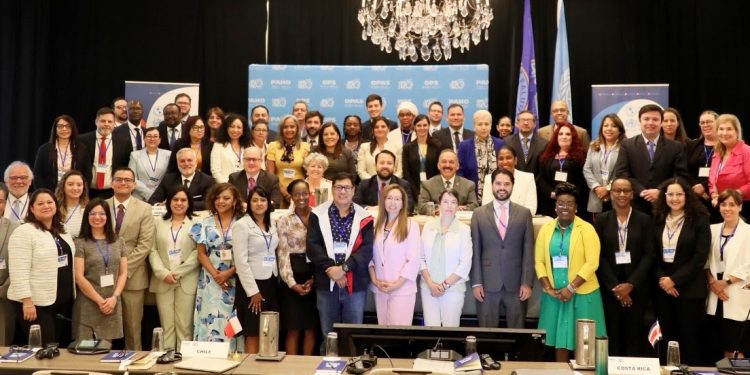Washington, DC, 10 July 2023 (PAHO) – The Pan American Health Organization (PAHO) is bringing together authorities from its 35 Member States in the U.S. capital this week to discuss the key components and implications for the Region of the future pandemic instrument, as well as the proposed amendments to the International Health Regulations (IHR-2005). The aim of the meeting is to share information, promote better understanding and facilitate consensus.
Both processes are driven and led by the Member States of the World Health Organization (WHO) and seek to ensure that the health, social and economic impact of the COVID-19 pandemic is not repeated, and that the world is better prepared to prevent or respond to future pandemics through increased collaboration, exchange, and high-level political commitment.
“Member States have a once-in-a-generation opportunity to approve a new instrument and amendments to the IHR-2005 to set the basis of a safer world for all humanity,” said Dr. Jarbas Barbosa, PAHO Director, in a video message at the opening of the meeting. “It is essential that Member States continue to engage actively in the deliberations in Geneva, ensuring proper interaction and alignment between their respective capitals and permanent missions,” he said.
Until Wednesday, representatives of the Ministries of Health and Foreign Affairs of the countries of the Americas will participate in the second meeting convened by the PAHO Director to “facilitate their meaningful participation” in the deliberations. The meeting also includes members of countries’ permanent missions to the United Nations in Geneva and to the Organization of American States (OAS) in Washington.
In December 2021, the World Health Assembly established the Intergovernmental Negotiating Body (INB) to draft and negotiate a convention, agreement, or other international instrument within the framework of the WHO Constitution to strengthen pandemic prevention, preparedness and response. This will be submitted for approval in 2024.
Last year, the World Health Assembly created a working group of Member States to examine the proposed amendments to the IHR, a legally binding agreement to prevent the international spread of disease. The IHR was previously amended in 2014, to extend for life the validity of the yellow fever vaccination certificate, and in 2022, to reduce the duration of entry into force of future amendments from 24 to 12 months.
The face-to-face meeting in Washington is being held in preparation for the Sixth meeting of the INB (July 17-21) and the Fourth meeting of the IHR Working Group (July 24-28), when delegates from all WHO member countries will continue in-depth discussions on the preliminary draft pandemic instrument, chapter by chapter, as well as proposed amendments to the IHR (2005).
An effective pandemic agreement – based on solidarity among countries – is expected to help ensure that health personnel worldwide are better equipped for the next pandemic, and that the production and distribution of vaccines and other medical products is more equitable. It also aims to ensure effective early detection and response measures against potential pandemic pathogens, and to improve the response capabilities of health, laboratory and research services, among other objectives.


















